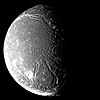Ariel is the brightest and third most massive of the 27 known moons of Uranus. Discovered on 24 October 1851 by William Lassell, it is named for a sky spirit in Alexander Pope's The Rape of the Lock and Shakespeare's The Tempest. Like its parent planet, Ariel orbits on its side, giving it an extreme seasonal cycle. As of 2011, almost all knowledge of Ariel derives from a single flyby of Uranus performed by the spacecraft Voyager 2 in 1986, which managed to image 35% of the moon's surface. There are no plans at present to return to study the moon in more detail. After Miranda, Ariel is the second-smallest of Uranus's five round satellites, and the second-closest to its planet. Among the smallest of the Solar System's 19 known spherical moons (it ranks 14th among them in diameter), Ariel is composed of roughly equal parts ice and rocky material. Like all of Uranus's moons, Ariel probably formed from an accretion disk that surrounded the planet shortly after its formation, and, like other large moons, it may be differentiated, with an inner core of rock surrounded by a mantle of ice. Ariel has a complex surface comprising extensive cratered terrain cross-cut by a system of scarps, canyons and ridges. The surface shows signs of more recent geological activity than other Uranian moons, most likely due to tidal heating. (more...)
Recently featured: Buildings of Jesus College, Oxford – SMS Baden – Coenred of Mercia
